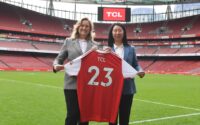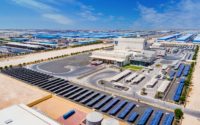Ahmed Bin Mohammed Attends AMF Session Titled ‘From The Desert To The Stars’
His Highness Sheikh Ahmed bin Mohammed bin Rashid Al Maktoum, Second Deputy Ruler of Dubai and Chairman of the Dubai Media Council, today attended a session at the21stArab Media Forum titled ‘From the Desert to the Stars’ featuring UAE astronaut Dr. Sultan Al Neyadi.
Walking in to a rousing standing ovation, the pride of the Arab world, Dr. Al Neyadi spoke about the childhood dream that spurred him on to overcome trials and tribulations in life and carve a place for himself and his nation in history while participating in a session that officially marked the culmination of a hugely successful 2023 edition of the Arab Media Forum.
In a session moderated by Mohammed Salem of Dubai Media, Dr. Al Neyadi shared some awe-inspiring moments from his mission while recounting the small motivations that steeled him for the bigger challenges in life.
The session was attended by His Excellency Mohammad bin Abdullah Al Gergawi, Minister of Cabinet Affairs; Her Excellency Mona Ghanem Al Marri, Vice President and Managing Director of the Dubai Media Council and President of the Dubai Press Club; UAE astronaut Hazza Al Mansoori; and His Excellency Salem Humaid Al Marri,Director General of the Mohammed Bin Rashid Space Centre (MBRSC).
Asked to describe the moment that stirred the greatest anticipation in him as the spacecraft rocketed back to earth, Dr. Al Neyadi picked the return to a gravity environment after six months as the most eagerly awaited. “We were returning from zero gravity to gravity after six months but the challenge of re-entry loomed. It entailed extreme temperatures. But I trusted my training. Then ensued a rattling 60 minutes of descent. I thank God that we were able to succeed. I feel proud to have written a new history of Arabs for Arabs,” he said.
Dr. Al Neyadi then jogged his memory to his childhood in Al Ain’s Umm Rafaneighbourhood. When queried if he had still been optimistic that a person from such an unassuming setting would travel to space, he replied: “We grew up in simple surroundings. Very lucky to have lived away from the limelight, in a place with clear skies, where we could always see the stars, the Milky Way. I would like to thank my parents. My father had only had a normal schooling and my mother had missed out on that as well. They still trained me to measure up in life at every turn. I will always remember the three things they taught us: To believe in what we did, to praise God, and that learning and education would pay back.”
Dr. Al Neyadi said the guiding principles of Emirati society always inspired him and the emphasis on education was most noteworthy, he said.
Dr. Al Neyadi also recalled that when he returned home after the mission, he was told that the day of his return had been marked like a festival in the UAE. He joked about his newly found VIP status. He recalled the magical moment when he was received by the UAE leaders. “I could make out that behind these men stands a whole nation,” he said.
He urged his fellow Emiratis to give their best for the nation in whatever they did and assured them that they would always have the full support of the leadership in that endeavour.
Asked if he had felt lonely at any point during the mission, Dr. Al Neyadi said that people undertaking space missions are made aware of what the task entails at every stage of planning and training. There are many requirements. “We are taught to deal with loneliness – while living in a confined space with people of other cultures and nationalities. I just had this busy schedule with the maintenance schedule on the ISS and the space experiments that it left no time to feel lonely.”
Touching upon the media’s role in taking his experiences to the public, he said he had initially harboured doubts whether the small videos being made from the space station could convey the scale of what he and his fellow astronauts were trying to achieve but came to appreciate the media’s role.
Dr. Al Neyadi said the UAE was taking confidence from its space forays to go still further. He said international space missions don’t have people to eat and sleep in space. Such missions look for individuals who can reassure about their abilities and display credibility. He said his fellow Emirati astronaut Hazza Al Mansoori told him later that international teams undertaking space missions are always looking to see that the people on their team can actually do the job.
Hailed as a role model for Emiratis and Arabs and having come to be acknowledged as a key personality shaping the Arab scientific identity, Dr. Al Neyadi sought to point out that Arabs had a civilisation all their own way back given the evidence of the Egyptian and Damascene eras. He reiterated that it could all be traced back to one thing: “education, education, education.”
Asked if he missed space now that he was back, Dr. Al Neyadi replied: “Space travel was part of a childhood dream to achieve something exceptional. Imagine there are less than 600 people who have lived this experience. And yet we have to work with people of different religions, nationalities to get there.”
Dr. Al Neyadi also showed his witty side. “I told Salem Al Marri,” he said referring to the Director General of the Mohammed Bin Rashid Space Centre, “We all need to go to the moon, Hazza, me, you,” before quipping “If media people fit in, we can all go.”







